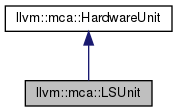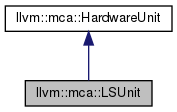A Load/Store Unit implementing a load and store queues. More...
#include "llvm/MCA/HardwareUnits/LSUnit.h"


Public Types | |
| enum | Status { LSU_AVAILABLE = 0, LSU_LQUEUE_FULL, LSU_SQUEUE_FULL } |
Public Member Functions | |
| LSUnit (const MCSchedModel &SM, unsigned LQ=0, unsigned SQ=0, bool AssumeNoAlias=false) | |
| void | dump () const |
| Status | isAvailable (const InstRef &IR) const |
| void | dispatch (const InstRef &IR) |
| virtual bool | isReady (const InstRef &IR) const |
| void | onInstructionExecuted (const InstRef &IR) |
 Public Member Functions inherited from llvm::mca::HardwareUnit Public Member Functions inherited from llvm::mca::HardwareUnit | |
| HardwareUnit ()=default | |
| virtual | ~HardwareUnit () |
Detailed Description
A Load/Store Unit implementing a load and store queues.
This class implements a load queue and a store queue to emulate the out-of-order execution of memory operations. Each load (or store) consumes an entry in the load (or store) queue.
Rules are: 1) A younger load is allowed to pass an older load only if there are no stores nor barriers in between the two loads. 2) An younger store is not allowed to pass an older store. 3) A younger store is not allowed to pass an older load. 4) A younger load is allowed to pass an older store only if the load does not alias with the store.
This class optimistically assumes that loads don't alias store operations. Under this assumption, younger loads are always allowed to pass older stores (this would only affects rule 4). Essentially, this class doesn't perform any sort alias analysis to identify aliasing loads and stores.
To enforce aliasing between loads and stores, flag AssumeNoAlias must be set to false by the constructor of LSUnit.
Note that this class doesn't know about the existence of different memory types for memory operations (example: write-through, write-combining, etc.). Derived classes are responsible for implementing that extra knowledge, and provide different sets of rules for loads and stores by overriding method isReady(). To emulate a write-combining memory type, rule 2. must be relaxed in a derived class to enable the reordering of non-aliasing store operations.
No assumptions are made by this class on the size of the store buffer. This class doesn't know how to identify cases where store-to-load forwarding may occur.
LSUnit doesn't attempt to predict whether a load or store hits or misses the L1 cache. To be more specific, LSUnit doesn't know anything about cache hierarchy and memory types. It only knows if an instruction "mayLoad" and/or "mayStore". For loads, the scheduling model provides an "optimistic" load-to-use latency (which usually matches the load-to-use latency for when there is a hit in the L1D). Derived classes may expand this knowledge.
Class MCInstrDesc in LLVM doesn't know about serializing operations, nor memory-barrier like instructions. LSUnit conservatively assumes that an instruction which mayLoad and has unmodeled side effects behave like a "soft" load-barrier. That means, it serializes loads without forcing a flush of the load queue. Similarly, instructions that both mayStore and have unmodeled side effects are treated like store barriers. A full memory barrier is a 'mayLoad' and 'mayStore' instruction with unmodeled side effects. This is obviously inaccurate, but this is the best that we can do at the moment.
Each load/store barrier consumes one entry in the load/store queue. A load/store barrier enforces ordering of loads/stores:
- A younger load cannot pass a load barrier.
- A younger store cannot pass a store barrier.
A younger load has to wait for the memory load barrier to execute. A load/store barrier is "executed" when it becomes the oldest entry in the load/store queue(s). That also means, all the older loads/stores have already been executed.
Member Enumeration Documentation
◆ Status
Constructor & Destructor Documentation
◆ LSUnit()
| llvm::mca::LSUnit::LSUnit | ( | const MCSchedModel & | SM, |
| unsigned | LQ = 0, |
||
| unsigned | SQ = 0, |
||
| bool | AssumeNoAlias = false |
||
| ) |
Definition at line 25 of file LSUnit.cpp.
References llvm::MCProcResourceDesc::BufferSize, llvm::MCSchedModel::getExtraProcessorInfo(), llvm::MCSchedModel::getProcResource(), llvm::MCSchedModel::hasExtraProcessorInfo(), llvm::MCExtraProcessorInfo::LoadQueueID, and llvm::MCExtraProcessorInfo::StoreQueueID.
Member Function Documentation
◆ dispatch()
Definition at line 69 of file LSUnit.cpp.
References assert(), llvm::mca::InstructionBase::getDesc(), llvm::mca::InstRef::getInstruction(), llvm::mca::InstRef::getSourceIndex(), llvm::mca::InstrDesc::HasSideEffects, llvm::SmallSet< T, N, C >::insert(), llvm::mca::InstrDesc::MayLoad, and llvm::mca::InstrDesc::MayStore.
Referenced by llvm::mca::Scheduler::dispatch().
◆ dump()
| void llvm::mca::LSUnit::dump | ( | ) | const |
Definition at line 43 of file LSUnit.cpp.
References assert(), llvm::SmallSet< T, N, C >::count(), llvm::dbgs(), llvm::SmallSet< T, N, C >::insert(), LLVM_DEBUG, and llvm::SmallSet< T, N, C >::size().
◆ isAvailable()
| LSUnit::Status llvm::mca::LSUnit::isAvailable | ( | const InstRef & | IR | ) | const |
Definition at line 88 of file LSUnit.cpp.
References llvm::mca::InstructionBase::getDesc(), llvm::mca::InstRef::getInstruction(), LSU_AVAILABLE, LSU_LQUEUE_FULL, LSU_SQUEUE_FULL, llvm::mca::InstrDesc::MayLoad, and llvm::mca::InstrDesc::MayStore.
Referenced by llvm::mca::Scheduler::isAvailable().
◆ isReady()
Definition at line 97 of file LSUnit.cpp.
References assert(), llvm::SmallSet< T, N, C >::begin(), llvm::SmallSet< T, N, C >::count(), llvm::SmallSet< T, N, C >::empty(), llvm::mca::InstructionBase::getDesc(), llvm::mca::InstRef::getInstruction(), llvm::mca::InstRef::getSourceIndex(), llvm::mca::InstrDesc::MayLoad, llvm::mca::InstrDesc::MayStore, and llvm::SmallSet< T, N, C >::size().
Referenced by llvm::mca::Scheduler::isReady().
◆ onInstructionExecuted()
Definition at line 155 of file LSUnit.cpp.
References llvm::SmallSet< T, N, C >::begin(), llvm::dbgs(), llvm::SmallSet< T, N, C >::empty(), llvm::SmallSet< T, N, C >::erase(), llvm::mca::InstructionBase::getDesc(), llvm::mca::InstRef::getInstruction(), llvm::mca::InstRef::getSourceIndex(), LLVM_DEBUG, llvm::mca::InstrDesc::MayLoad, and llvm::mca::InstrDesc::MayStore.
Referenced by llvm::mca::Scheduler::isAvailable(), and llvm::mca::Scheduler::select().
The documentation for this class was generated from the following files:
- include/llvm/MCA/HardwareUnits/LSUnit.h
- lib/MCA/HardwareUnits/LSUnit.cpp
 1.8.13
1.8.13